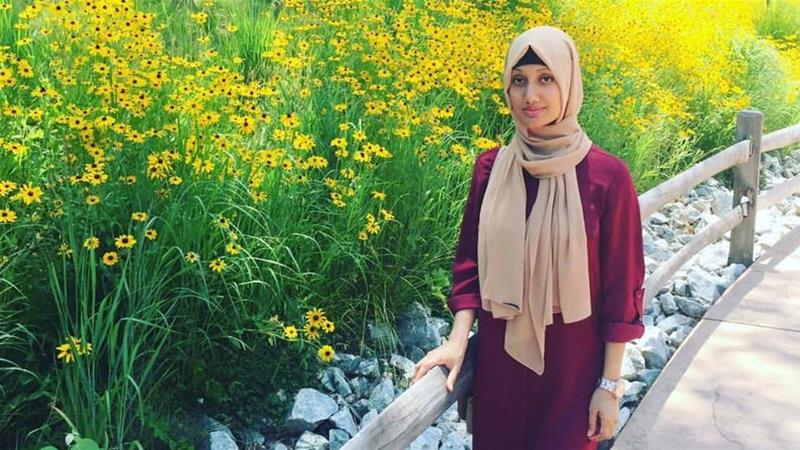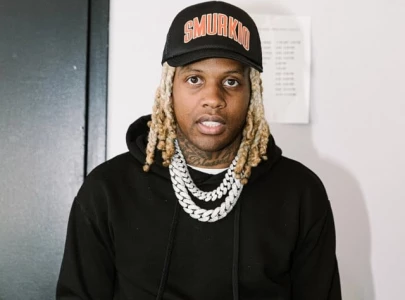
The Bangladesh native migrated to the United States at the age of 11 and was constantly bullied throughout middle and high school.
The bullying took on another level after the deadly coordinated attacks of September 11, 2001.
"Every day, I would face different challenges just walking on the street," she told Al Jazeera. "I was chased, spit on, surrounded by men, called a terrorist, Osama bin Laden, etc."
To connect with others who were facing similar challenges because of their head covering, Khan invited Muslim women to share their experiences of discrimination on social media.
‘There’s no shame in wearing a hijab’
"As I read through the stories, I saw my own struggles in my sisters," the 35-year-old said.
That is when Khan decided to launch the World Hijab Day (WHD).
What the hijab means to me
Each year on February 1, Khan's non-profit organisation invites females of all faiths, backgrounds and ethnicities to wear the hijab for a day in solidarity with Muslim women worldwide.
"By walking in my shoes for one day on February 1, women would see that I am no different from them," the president and founder of the World Hijab Day Organisation explained.
"Perhaps, this one day experience will make them see the hijab in a different light."
Breaking stereotypes
Since its inception in 2013, more than 70 global ambassadors from over 45 countries have been involved and women from around 190 countries participate in the annual event.
Ellie Lloyd, a British Christian, and her 11-year-old daughter are among those donning the hijab.
"I believe women should be free from prejudice and discrimination for their choice to cover their hair," said Lloyd, who is also Qatar's WHD ambassador.
"If I choose to wear a hat, I am not judged," she told Al Jazeera. "If I choose to wear my hair up or down or braided, I am not judged.
"So why is it fair for a woman who chooses to wear a scarf to be judged?"
Afaf Nasher, executive director for the New York chapter at the Council on American-Islamic Relations (CAIR), believes the yearly initiative helps break the "false stereotypes" about the religious head covering.
"A Muslim woman wearing a hijab is hypocritically viewed as foreign, submissive, and backwards," she told Al Jazeera.
"WHD shines a positive counter-message by highlighting the diversity and strength of Muslim women who observe hijab."
Meanwhile, others have raised concern that one day in a hijab does not give outsiders the true sense of being a Muslim.
Zahra Billoo, CAIR's executive director of the San Francisco Bay area, welcomed the effort from non-Muslim women but added: "Others are sometimes concerned that the hijab is not an accessory, and so even wearing it for a day, in solidarity, doesn't really give someone the full experience and can actually risk tokenising the experience of Muslim women."
Islamophobia
Miroslava, a Czech native who works in the UK, has had derogatory slurs hurled at her like, received death threats, been spat in the face and followed ever since she started wearing the hijab four years ago.
Canada schoolgirl attacked over hijab
"Walking on the streets, I get time to time funny questions such as: 'Don't you feel too hot in this?'" the 35-year-old divorcee told Al Jazeera.
"Few weeks after I moved into a new place, I came home and found a sprayed message over my windows: 'this is not your country!'"
Muslim woman in India denied job for wearing hijab
Globally, advocacy groups have reported a rise in apparent Islamophobia and hate crimes in recent years.
Los Angeles resident Ojaala Ahmad says "hijab makes women more visibly Muslim and therefore an easier target for Islamophobes."
After President Donald Trump's election, the number of anti-Muslim hate crimes in the US rose 91 per cent in the first half of 2017, compared with the same period in 2016, according to a CAIR report.
"A Muslim woman's headscarf was a trigger in 15 percent of incidents," the group said.
Civil rights activists in the country are worried about the trend.
"We have a president who doesn't care and is attacking the Muslim community on a daily basis and so I am concerned about the people that are emboldened by his racism and bigotry," said CAIR's Billoo.
Meanwhile, Muslim women in the UK are three times more likely to be economically inactive, a government-commissioned report found in September 2017.
Hijab Day: JI urges women to cover themselves
"I am particularly very concerned about discrimination women who wear the hijab face in the job market," said Khan.
The World Hijab Day Organisation is working on building an educational programme called "Corporate Anti-Islamophobia Program (CAIP)" to lessen discrimination against Muslims in the corporate sector.
There was anger among Muslim women in Europe last year when the European Court of Justice ruled that employers are entitled to ban staff from wearing visible religious symbols.
Beata Rocska, a Hungarian convert living in the capital Budapest, said her boss at a multinational firm was warned against hiring her for being a "terrorist".
"Everyday insult is such a common thing, especially since our politicians started to build their campaign upon hatred towards the [Muslim] immigrants," the 26-year-old told Al Jazeera.
#StrongInHijab
Despite the challenges, Khan is optimistic that social media has given Muslim women a platform to voice their discontent.
By marking World Hijab Day, the non-profit is looking to build bridges of understanding, awareness, and education about the hijab.
"Hijab is not just a piece of cloth I use to cover my head," said WHD's founder.
"It's much more than that. Hijab represents who I am as a person."
In the month leading up to February 1, women share their experiences of wearing the hijab on social media under the hashtag #WorldHijabDay.
This year's slogan is #StrongInHijab.
"I wear the #hijab because I feel peaceful to do it. I am empowered not oppressed. I am #Stronginhijab."
— World HijabDay (@WorldHijabDay) January 29, 2018
(Nur Rafiqah, Singapore) #WorldHijabDay pic.twitter.com/cgjlpGRgbN
It is not only a head scarf but it guides your chastity. We shouldn't be judged by the color of our nails or the color of our lipstick. We are worth more than that; we are a heart and a soul and a mind that thinks!-Hawa #StrongInHijab #WorldHijabDay #Hijab pic.twitter.com/MEH160f0uk
— World HijabDay (@WorldHijabDay) January 20, 2018
My #Hijab was never a barrier to my ambitions &the life I wanted to live. It is not true tht the hijabi #woman is controlled by her hijab and that it doesn't let her live like other women. In contrary, the hijab awakens us to be more confident.- Dr. Ebtsam Alqadi #StrongInHijab pic.twitter.com/erLaq7ZjNI
— World HijabDay (@WorldHijabDay) January 20, 2018
"7 yrs ago, I decided to make the best decision of my life. I truly believe I have found myself as a person. I felt so strong & empowered when I put my hijab on, as if I were placing a crown on my head."-Samah #StrongInHijab #WorldHijabDay pic.twitter.com/ImUXBT68Bs
— World HijabDay (@WorldHijabDay) January 17, 2018
#Hijab is my crown, my helmet, my most valuable jewel and at the same time, reminds me to be most humble. Hijab is not what I wear, it is WHAT I AM."-Marcela Daza (Colombia) #StrongInHijab #WorldHijabDay pic.twitter.com/tZXXEhnFdU
— World HijabDay (@WorldHijabDay) January 15, 2018
This article originally appeared on AlJazeera



1730797299-0/BeFunky-collage-(21)1730797299-0-165x106.webp)


1730799445-0/Untitled-design-(52)1730799445-0-270x192.webp)
1730800230-0/Copy-of-Untitled-(5)1730800230-0-270x192.webp)







1730706072-0/Copy-of-Untitled-(2)1730706072-0-270x192.webp)
COMMENTS
Comments are moderated and generally will be posted if they are on-topic and not abusive.
For more information, please see our Comments FAQ